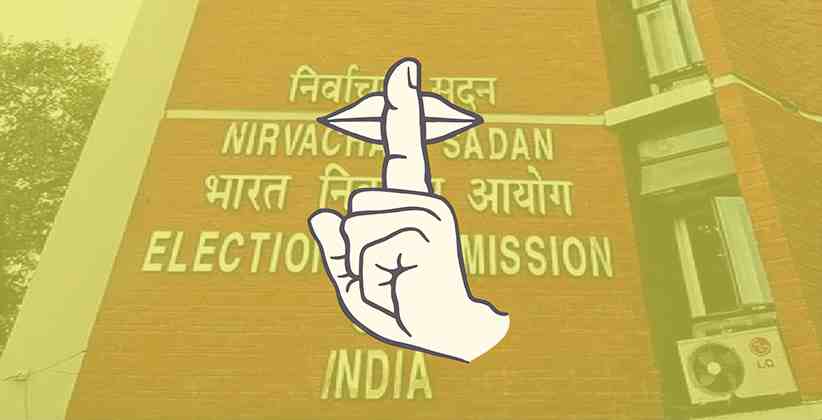The time of Election season, is the time for the Election Commission of India to keep a close watch on the Model Code of Conduct (MCC) - "a set of guidelines issued by the Election Commission of India for conduct of political parties and candidates during elections mainly with respect to speeches, polling day, polling booths, portfolios, election manifestos, processions and general conduct."
A watch has to be kept on MCC's violations across the country amid ongoing elections; all political parties - their political leaders, members, functionaries or party workers who are not registered voters will have to vacate the constituency within this period. This code was amended on 16th March 2019 to put forth these prohibitions and further observe the silence. Examples of bans on politicians for derogatory speeches and remarks are some of the examples of ECI's action policy to ensure free and fair polling throughout the country. Media also plays a key role during this silent period. This silence is basically a ban on any sort of political campaigning that takes place prior to the voting to give voters some requisite amount of time to consider the final decision to cast their votes to.
So what is this period of Silence?
This period begins approximately 48 hours before the voting day and ends after the polling has ended. During this particular time, no active campaigning by any candidates or political parties is allowed, neither any digital media is allowed to carry forth matters related to the entirety of elections. Different durations have been observed in different countries that observe this particular phenomena. Few of these countries are - Singapore, Slovenia, Hungary, Croatia, Russia, Bulgaria, Albania, Poland and Ireland.
Section 126 of the Representation of People's Act, 1951 states that -
No person shall
(a) convene, hold, attend, join or address any public meeting or procession in connection with an election; or
(b) display to the public any election matter by means of cinematograph, television or other similar apparatus; or
(c) propagate any election matter to the public by holding, or by arranging the holding of, any musical concert or any theatrical performance or any other entertainment or amusement with a view to attracting the members of the public thereto, in any polling area during the period of forty-eight hours ending with the hour fixed for the conclusion of the poll for any election in that polling area.
It further mandates the observance of 48 hours' period until the conclusion of the poll for the election silence. Only Print media is exempt from the provisions, although in the 2016, an amendment was proposed and put forth to ban the print media as well by the Election Commission, but it never found a niche within the Act.
In January 2019, ECI had considered bringing about a report of a committee to review the scope of Section 126 and thus wrote to the Ministry of Law to amend Section 126 of the Representation of the Peoples Act, 1951 to bring print media, news portals and social media within the purview of the 48 hour ban. The insertion of provision in Section 126 (2) was put forth too, that laid down the courts to take cognizance of the complaints made under the authority of the ECI or the State Chief Electoral Officer regarding any sort of violations during that period. The commission had also asked for the inclusion of "intermediaries" as defined in Section 2 (w) of the Information Technology Act, 2000 that defines intermediaries as any person who on behalf of another person receives, stores or transmits that record or provides any service with respect to that record and includes telecom service providers, web-housing service providers, search engines, online payment sites, online auction sites, online market places and cyber cafes.
An explanation clause under Section 126 (2) to bring about the definition of electronic media within it's purview that includes the Internet, radio and televion [IP Television, Satellite, Terrestrial or Cable channels, Internet/digital versions Print Media, Mobile and such other media] that is owned by the public or the private bodies was also taken under consideration by the ECI. It further said that the Law Commission in it's 255th report that was a sequel to the Ministry of Law and Justice's request made in January 2013 to "Consider the issue of 'Electoral Reforms' in its entirety and suggest comprehensive measures for changes in the law" had recommended amendments to Section 126 including the bringing of print media within the purview. [Print media would likely include any newspaper, magazine or periodical, poster, placard, handbill or any other document]. Further, the issues that have violated the provisions of Section 126 of the Act have to be raised before the commission - particularly on the infringement and telecast broadcasting of election matters.
Political parties, their leaders and campaigners are called upon and instructed to observe the silence period and further to not violate any part of Section126. As per the directive of ECI, in the elections that are multiphased, the silence period will be on in certain constituencies where campaigns are taking place in other regimes depending on the entire allotment of dates regarding the poll. During this event, there should not be any direct or indirect reference that would likely amount to a sort of solicited support for the parties or the candidates that are observing the silence period. The silence should not be disrupted in the silence zoned constituencies. Any kind of press conference and interviews on election matters has to shunned by leaders in the political arena.
Author - Dyuti Pandya







